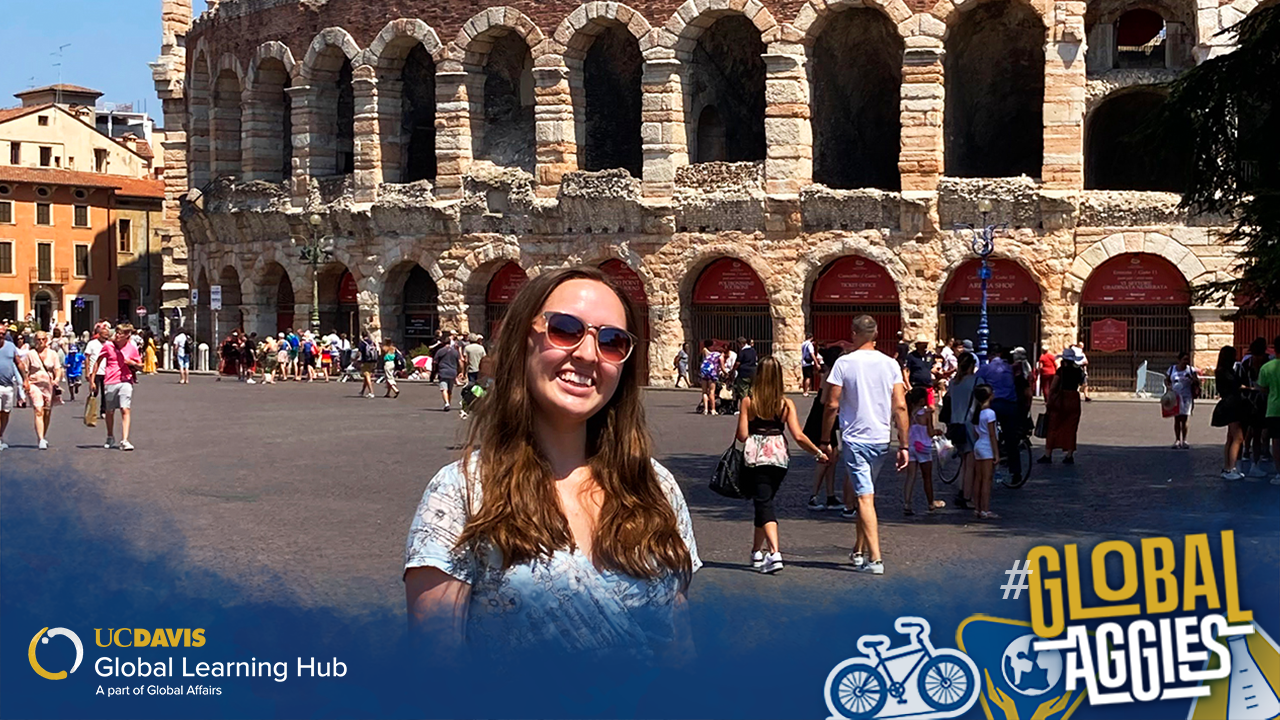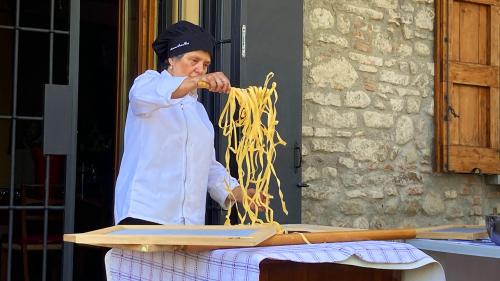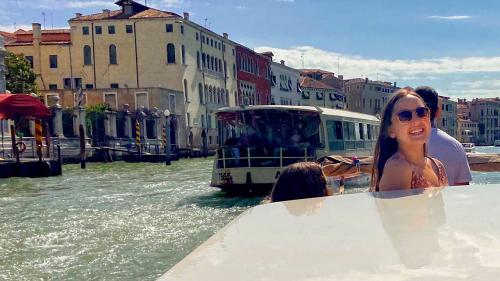
Global Aggies: UC Davis Summer Abroad Italy—Science of the Mind
Name
Haley Vandermey
Major/Minor
Linguistics and Psychology Major
Class Standing
Senior
Graduation Year
2023
Program Title, Location, Duration
UC Davis Summer Abroad Italy, Science of the Mind
What motivated you to participate in a study abroad or internship program during your time at UC Davis?
I went into my study abroad program wanting to experience another culture in depth. I knew there was only so much I would ever be able to learn on a short-term trip or vacation, so instead, I wanted to take the opportunity to experience life in another country for an extended period of time through study abroad.

What led you to choose the program you participated in?
I chose a program that would allow me to focus on a topic within one of my majors that I was especially interested in. Cognitive Neuroscience is a topic within psychology that I have often struggled with, but I knew that I would be even more highly motivated to learn within the context of study abroad, since I would already be learning so many new things through experience. So, I took on the challenge of studying a topic that I was interested in, yet found difficult, while abroad.
What was your experience like in this program? What did you learn from your experience both academically and in interacting with other cultures, people, and places?
While traveling, I learned that it is important to be adaptable, especially when pushing the limits of your comfort zone. When navigating a new place, talking to people in a new language, and trying to operate within a new culture, inevitably some things will not go according to plan. In order to get the most out of any experience, it is necessary to be able to adapt to the changes as they come.
What was a typical day like on your program?
Most days I would wake up around 7 a.m., eat breakfast in the accommodations' dining hall after getting dressed, then walk about 20 minutes into town with some of my classmates for our morning class. After class, some of us would go into the city center for lunch, while others would head back to the accommodations to rest or study. Some days we had afternoon activities scheduled such as day trips to nearby cities, walking tours in the host city or cooking classes. On days when there were no activities planned, many of us would spend the day in the city center seeing the sites that the city had to offer. Then, we would eat dinner in town or at the accommodations.
What was a challenging or rewarding part of the program for you?
It was especially difficult for me to adapt to the physical activity that the program required. Much of Bologna is very walkable, but I was not used to walking so far and so frequently, as it is not possible to walk everywhere I need to go in the United States. While I appreciated this aspect of daily life in Italy, it took some getting used to before I was able to truly embrace it and see the benefits. I found it rewarding in the long run, though, and now walking is something I hope to incorporate into my daily life at home when possible.

What’s one of your most memorable experiences from your program?
Early on in the trip, our group attended a cooking class from a local family that runs a cooking school out of their home. We watched as one of our hosts made pasta, sauce, and pastries from scratch, and I remember listening in awe as I learned about how much history could go into just one single meal. After dinner, we enjoyed the view, danced and talked with our hosts until it was time to leave. That evening was the first time on the trip that I felt truly comfortable in my surroundings and realized that I may be able to get to know the culture in more depth than I expected.
What advice do you have for someone considering your program or an international experience in general? What would you like to share with students who may share similar identities or experiences as you?
Studying abroad can be a frightening prospect, but it is by far one of the most worthwhile experiences you can have in your academic career if you choose the right program for your goals and needs. So long as you go into the experience with an open mind and a willingness to have your perspectives challenged, there is a lot to be learned from a study abroad program. Coming from a low-income background, I would encourage students in similar situations to look into financial resources such as scholarship programs before dismissing the idea of a study abroad program entirely.
What was your biggest concern in regards to the time and cost of your program? Were you able to overcome that concern, and if so, how? What advice would you give someone who has similar concerns?
My biggest concern about the time and cost of studying abroad was whether or not I would be able to justify the cost of the program while also not being able to work during that time. On my own, I may not have been able to manage the cost and time commitment. Fortunately, I was chosen for the Benjamin A. Gilman International Scholarship Program as well as a Study Abroad Award through the Global Learning Hub. This funding made the cost much more feasible for me. I would strongly advise someone with similar concerns to consider these scholarship options and to talk to an advisor about other possible solutions. It can feel unlikely that you would be chosen for a scholarship—especially one with a high number of applicants—but it can be worth the time and effort if you take advantage of your available resources to submit a well-crafted application.
How do you think your program experiences will benefit you in the future—thinking academically, future career goals, or personally?
In addition to working toward my degree by taking a class in my major, I also went through a lot of personal development during my trip. I learned how to open myself up to new people, places and experiences—even when it is not very comfortable or familiar in the moment. This is a skill I wasn't sure I would ever develop and it is definitely a skill that I will be applying to my academic, professional and personal life now and in the future.
About the Global Learning Hub at UC Davis
As a part of Global Affairs, the Global Learning Hub aims to inspire global curiosity, understanding, and engagement.
Through the Global Learning Hub, every UC Davis student can find global learning opportunities available on campus, in the region, virtually, and internationally. The Hub offers global learning programs, workshops, and resources that enhance all UC Davis students’ academic and career pursuits through four broad areas of opportunities: Community Engagement; Global Skills and Leadership; Internships and Research; and Study Abroad. UC Davis is committed to preparing the next generation of global problem solvers and change makers. As such, we aim to prepare our undergraduate, graduate, and professional students to solve global challenges collaboratively, equitably, and sustainably.